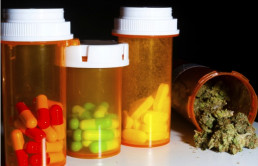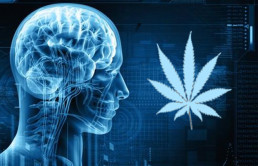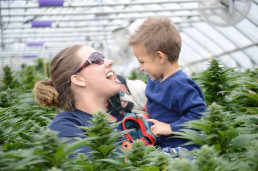Study Suggests Cannabis Combats Chronic Migraines
Study Suggests Cannabis Combats Chronic Migraines
Afflicted with chronic migraines? You might be suffering from a cannabinoid deficiency. Cannabis shows promise as a viable treatment for migraines. A new study indicates that medical marijuana significantly drops the frequency of migraines. Interestingly enough, cannabis was the standard treatment for migraines from 1874 to 1942. This “new” treatment is now being studied for efficacy.
Researchers at the Skaggs School of Pharmacy and Pharmaceutical Sciences at the University of Colorado Anschutz Medical Campus studied 121 patients between 2010 and 2014. Out of the 121 patients, 103 saw a decrease in migraines. On average, migraines dropped from 10.4 to 4.6 migraines per month, a figure that is considered clinically significant.
The study was published January 9th in the journal Pharmacotherapy.
Professor Laura Borgelt, PharmD, FCCP, BCPS, is senior author of the study. “There was a substantial improvement for patients in their ability to function and feel better,” wrote Borgelt. “Like any drug, marijuana has potential benefits and potential risks. It’s important for people to be aware that using medical marijuana can also have adverse effects.”
Patients were gathered at Gedde Whole Health, a Colorado-based practice that focuses on cannabis treatments. Researchers found that inhaled cannabis was better suited for instantly treating acute migraines. They also found that edibles take longer to take effect, but help prevent headaches.
Positive effects were the most commonly reported outcome from the trial. 85 percent of participants reported decreased frequency of migraines, and 14 patients reported that the migraines had ceased altogether. “There were some patients who reported more than 15 migraines per month before using cannabis. After using cannabis, they were reduced to one to two migraines per month,” researcher Danielle Rhyne said.
Cannabinoids play an important role by affecting critical neurotransmitters like serotonin and dopamine. “We believe serotonin plays a role in migraine headaches, but we are still working to discover the exact role of cannabinoids in this condition,” Borgelt said.
An earlier report in 2007 in the European Journal of Critical Pharmacology suggested that patients with chronic migraines have low levels of the endogenous cannabinoids anandamide and 2-arachidonylglycerol (2-AG). “These data support the potential involvement of a dysfunctioning of the endocannabinoid and serotonergic systems in the pathology of chronic migraine and medication-overuse headaches,” they wrote.
Borgelt added that only a randomized, placebo-controlled clinical trial would definitively enable medical marijuana to be proven effective. Federal laws, however, have gotten in the way. “If patients are considering medical marijuana they should speak to their health care provider and then follow up so we can track the impact of their overall treatment,” Borgelt said. “Open communication is necessary because we need to know how all of these treatments work together.”
It is currently unknown which strains are more effective for migraines. “Further research should be performed to determine if there is a preferred delivery method, dose, and strain of medical marijuana for migraine headache therapy as well as potential long-term effects of medical marijuana,” researchers concluded.
Study Indicates Cannabis Safer than Painkillers
Study Indicates Cannabis Safer than Painkillers
Nearly two million Americans are addicted to painkillers, and 16,000 fatally overdosed in 2013. According to a press release Tuesday, researchers at McGill University Health Centre in Montreal found cannabis to be a safer approach to chronic pain. It’s the first time cannabis has been studied for chronic pain in a long-term setting. Research indicates that states with legal medical marijuana have significantly less painkiller overdoses.
The study was conducted at seven pain-management facilities across Canada. Researched compared 215 patients who use cannabis to 216 patients who didn’t use cannabis. Users were given daily cannabis flowers containing 12.5 percent THC from a licensed producer. Patients completed panels of blood tests and were testing for lung function, pain, mood, and cognitive ability. “We found that both groups improved over time,” lead author Dr. Mark Ware said. “But the cannabis users actually improved significantly more than the control group.” The results will be published online in The Journal of Pain in mid October.
“This is the first and largest study of the long term safety of medical cannabis use by patients suffering from chronic pain ever conducted,” Ware stated, “We found that medical cannabis, when used by patients who are experienced users, and as part of a monitored treatment program for chronic pain over one year, appears to have a reasonable safety profile.”
Researchers say the cannabis users involved in the study smoked , vaporized, or consumed an average of 2.5 grams per day. “Our data show that daily cannabis users had no greater risk than non-users (control group) to experience serious adverse events,” said Ware. ”We found no evidence of harmful effects on cognitive function, or blood tests among cannabis consumers and we observed a significant improvement in their levels of pain, symptom distress, mood and quality of life compared to controls.”
Some minor side effects from cannabis were noted such as headache and dizziness. The researchers pointed out that they could not separate negative effects from patients that also smoked tobacco.
“It is important to note the limitations of the study,” adds Dr. Ware. “Patients were self-selected, not randomized, and most were experienced users. So what we are seeing is that it appears to be a relatively safe drug when used by people who have already determined that it helps them. We cannot draw conclusions about safety issues of new cannabis users”.
An study published in JAMA Internal Medicine found states with legal medical marijuana had a 24.8 percent less opioid overdoses. They also found that 60 percent of opioid overdoses come from patients with a legitimate doctor’s prescription. The study also suggests that American doctors are handing out painkillers like candy- painkiller prescriptions for non-cancer pain has doubled in the last decade. Most importantly, opioid death increases correlate neatly with opioid sale increases.
Doctors are waiting for a usable list of possible side effects in order to ethically prescribe cannabis. The longer cannabis is unavailable to patients the more they will continue to use painkillers.
Many Doctors Now Treating Opioid Addiction with Cannabis
Many Doctors Now Treating Opioid Addiction with Cannabis
Treating Opioid Addiction with Cannabis
As the state of Massachusetts faces its opioid problem, local doctors are using cannabis as a gateway out of addiction. Opioid dependence over time depletes dopamine, serotonin, and endorphin levels, and more importantly, destroys families. The Journal of American Medical Association published findings that the state of Colorado saw a drop of almost 25% in opioid deaths after legalising cannabis. Most recently, Massachussetts’ doctors are using cannabis to treat opioid addiction specifically.
Dr. Gary Witman is a member of Canna Care Docs, a network of cannabis clinics in Massachusetts. “We have a statewide epidemic of opioid deaths,” Witman told the Boston Herald. “As soon as we can get people off opioids to a nonaddicting substance — and medicinal marijuana is nonaddicting — I think it would dramatically impact the amount of opioid deaths.”
Dr. Witman looked at 80 patients that were addicted to either painkillers or muscle relaxants. He says that 75 of 80 of his patients dropped hard drugs after tapering off with cannabis for one month. Witman is hopeful of the benefits cannabis can provide toward effective pain management. “Endocannabinoids are even more powerful and the therapeutic benefits are even better,” he said.
Dr. Harold Altvater of Delta 9 Medical Consulting agrees. “You are basically taking something that can be very harmful for an individual, and substituting with another chemical, just like you would any other drug, that has a wider safety margin,” he said. “So if the goal is to decrease the body count … the goal would be to get them on to a chemical that was safer.” Overdosing on cannabis is scientifically impossible.
Many doctors around the world are questioning the gateway drug theory. Dr. Anil Kumar studies pain management. “It might be an exit drug for some, or an entry drug for others,” he said. “If you don’t have a way of monitoring this patient who is saying ‘give me marijuana and I will stop taking narcotics,’ they may do both.”
The Massachusetts Department of Public Health is surprisingly supportive. They have no official policy for medical marijuana and opioid addiction. Anything is better, it could be said, than the physical addiction and strife that opiates and opioids can cause. “DPH is committed to effectively administering the medical marijuana program in order to best serve patients safely and continues to work with the administration and stakeholders on developing strategies to curb the opioid epidemic in the commonwealth,” DPH spokesman Scott Zoback said.
Doctors nowadays are seeing cannabis as a safer alternative. “What we are seeing is that, in follow-up visits, patients have decreased and even eliminated their opioids,” said Dr. Uma Dhanabalan of Uplifting Health and Wellness, “It’s a problem when we are replacing one synthetic opioid with another synthetic opioid because, guess what … synthetic opioids kill, cannabis does not.” Dr. Dhanabalan’s patient Howard Bert hasn’t taken a pill in seven weeks. “The marijuana saved my bacon from discomfort and pain every time,” he said. “My doctor told me it has something to do with receptors. All I know is, it works.”
Meet the 'Criminal' Doctor Providing Patients with Cannabis Oil
Meet the ‘Criminal’ Doctor Providing Patients with Cannabis Oil
Dr. Andrew Katelaris of Australia is great example of a physician upholding the Hippocatic Oath, the universal ethical standard, regardless of outdated cannabis laws. The doctor has been brewing cannabis oil illegally for ten years. Katelaris was booted from the medical marijuana registry in 2005. The Pot Doctor is a new documentary about Katelaris’ zealous approach to medical marijuana research.
“It’s bizarre that in the 21st Century we have to hide the production of life-saving medicine,” Katelaris told News.com.au. Katelaris was arrested for indepedently conducting research into the drug for child epilepsy.
The threat of prosecution isn’t a worry for Dr. Katelaris, who is only concerned with the welfare of his patients. “I haven’t sought to avoid legal troubles,” Dr Katelaris said in The Pot Doctor. “Our primary motivation is to actually advance the cause of medical cannabis.”
Recently the Senate Legal and Constitutional Affairs Committee passed the Regulator of Medicinal Cannabis Bill which is the first step towards legal cannabis in Australia. “Over the last few years even though I have operated quite openly I haven’t attracted any negative legal intervention which is appreciated but we’re prepared to fight on any front that’s presented and if its necessary that we go to court and dispute the prohibition against medical cannabis and that’s what we will do.”
Dr. Katelaris was given the decision to either drop his research to continue as a registered doctor. It never stopped him from continuing his research. “It wasn’t a very hard decision,” he explained. “Seeing the therapeutic affects of what we were doing and the clear superiority of cannabis therapeutics whether they are used a sole agent or a combination agent.”
“Once you have seen that you can’t turn your back on people and say ‘yeah there’s something that will help you a great deal but you can’t have it. That’s simply not acceptable for me.”
“People say of you have sacrificed a lot, your career, but this is my career, right? If I was one of the yes men in a white coat, that’s not a career. That’s the role of a yes man in a white coat. It simply didn’t suit my personality. But I have not sacrificed my career, this is my career.”
Cassie Batten and Rhett Wallace were also interviewed about their four-year-old son Cooper. They hope medical marijuana will help him to walk. “Walking doesn’t seem out of the question now,” dad Rhett says in the film. “Since we have discovered the amazing therapeutic effects of CBD in childhood epilepsy, it is becoming imperative that our work not be disturbed because there is nothing worse than actually helping a child to achieve wellness and then by lack of product not being able to continue with that wellness,” Katelaris said in the film. “So therefore we are forced into hidden places to avoid the ignorant and draconian policies that are currently limiting access to medical cannabis for sick and dying children.”
Katelaris however has received some sharp criticism. “I am concerned by his approach where it is a bit holier than though. He seems to feel that he knows more than the scientific community,” Dr. Stephen Parnis of the Australian Medical Association told News.com.au.
Katelaris continues to research cannabis oil despite the risks he’s taking.
Study Indicates Cannabis Helps Schizophrenia
Study Indicates Cannabis Helps Schizophrenia
GW Pharmaceuticals(GWPH) of the UK released a study that demonstrates the efficacy of cannabis for the treatment of schizophrenia. GW Pharmaceuticals holds a US patent protecting the use of CBD for the treatment of psychosis and other disorders. So far, GW’s pipeline of proprietary cannabinoid products includes Epidiolex® and Sativex®, the latter which is approved in 27 countries.
The study, currently in Phase IIa, is exploring a placebo-controlled clinical trial of cannabidiol in 88 schizophrenic patients. All patients had experienced failure using first line anti-psychotic medications. Patients remained on their medication for a minimum of four weeks throughout the study. The scientists stated in the press release that CBD was “consistently superior” to a placebo.
The scientists noted that CBD is a new approach to schizophrenic medicine. Philip McGuire is Principal of Investigation of the study. “The addition of Cannabidiol to the medication of patients who were only partially responsive to standard anti-psychotic treatment produced significant improvements in outcome measures compared with placebo,” McGuire told MarketWatch. “The results are of particular interest because the pharmacology of CBD is distinct from existing anti-psychotic medications, all of which act via effects on dopamine receptors.”
It is noted that this merely reinforced the pre-clinical research of CBD for psychiatric medicine that GW Pharmaceuticals has conducted since 2007. In previous studies, CBD was investigated as a monotherapy as well. “These findings further reinforce the potential role of cannabinoids in the field of neuropsychiatric disease,” stated GW Pharmaceuticals CEO Justin Gover. “We believe that the signals of efficacy demonstrated in this trial, together with a notably reassuring safety profile, provide GW with the prospect of new and distinct cannabinoid neuropsychiatric product pipeline opportunity. Similar to our approach for Epidiolex, we believe that our future research in this area may lie within pediatric orphan neuropsychiatric indications and we intend to explore this as a focus for future trials.”
The study focused on several areas of improvement. CBD showed marked improvement of cognition in participants. The scientists involved in the study say the safety profile of CBD is “particularly reassuring.” The most common side effects were diarrhea (9.3% CBD vs 4.4% placebo), nausea (7% CBD vs 0% placebo), headache (7% CBD vs 8.9% placebo) and somnolence (0% CBD vs 6.7% placebo). One patient reported withdrawal from CBD, however, another reported withdrawal from the placebo.
The company filed for a US patent protecting the use of CBD for psychosis in April 2015. GW’s patent provides them with exclusivity until March 2029. Another patent is in the works. According to Fox News, the company’s UK shares jumped 12.5 percent and US shares jumped 10 percent. The company’s market capitalization is currently at $2.4 billion on September 15. The excitement is centered around the potential of Epidiolex®.
GW Pharmaceuticals plans on submitting a new drug application(NDA) to the US Food and Drug Administration in 2016. The company hopes to launch a successful commercial launch of Epidiolex®, as well as promoting their most recent drugs.
Young Boy Given 48 Hours to Live Now Cancer Free After Taking Cannabis Oil
Young Boy Given 48 Hours to Live Now Cancer Free After Taking Cannabis Oil
Three years ago Landon Riddle of Utah was diagnosed with Leukemia. His chest was full of tumors and his armpits and groin had swollen. The prognosis was grim: an 8-10% chance of living past the next 24 to 48 hours. Landon’s mother Sierra refused to accept his fate.
“It was the absolute most terrifying day of my life,” Riddle blogged. Acute Lymphocytic Leukemia or ALL is cancer of the blood and bone marrow. Landon was immediately started on chemo.
Riddle had to watch her son vomit up to 30 to 50 times a day. His appetite was gone. At his worst, Landon went on a 25 day food strike. It seemed like Landon’s time was near.
In January 2013, everything changed. “We discussed all of our concerns with his medical team in Utah and watched Landon continue to suffer and wither away as the piled on drug after drug,” Riddle told RYOT. “Then my mother came across cannabis oil online.” Sierra says Landon’s grandmother has always been against drug abuse, however, she found enough supporting evidence for medical marijuana. The Riddles knew that living in Utah at the time meant access to cannabis oil was impossible. Utah actually did legalise cannabis oil for children with epilepsy a year later with the passage of Charlee’s Law. This was not passed in time for Landon. Landon and his family became “cannabis refugees” fleeing to the state of Colorado.
Landon’s vomiting dropped from up to 50 times a day to 10 times a day. “Our hearts were filled with joy that cannabis brought back the smile to Landon’s face,” she blogged. “Landon started getting better and better! It was as if a miracle had happened! He was smiling again and started to eat again!” The chemotherapy left Landon battling with neuropathy, sometimes unable to walk.
Sierra Riddle was never charged for breaking the law. She worries about other parents that haven’t been as lucky as she has. “It is atrocious that anyone on the planet would be charged for choosing cannabis over pharmaceuticals,” Riddle said. “My heart goes out to Adam Koessler and Rumor Rose, along with uncountable other families that are affected by cannabis prohibition.”
Riddle wants to help other parents make the right decision for the welfare of their children. “Get ready for the fight of your life. Having a sick child is a battle in itself, but making this choice is a whole new world,” she said. “You’re going to need thick skin, intuition, and a solid team. Don’t waste time making sure every other pharmaceutical does more harm than good. If it feels wrong in your gut, it’s probably wrong.”
Landon’s cancer is currently in remission. Landon’s mother drives Landon from Utah to Colorado each month for his checkup. She has made it easy to make a difference for children like Landon with several projects. Her website offers addresses of John W. Hickenlooper, Michael F. Bennet, and Cory Gardner. Write your local representative. #TeamLandon #CannabisISSafer
Girl Suffering with 400 Seizures a Day Becomes First Medical Marijuana Patient in Mexico
Girl Suffering with 400 Seizures a Day Becomes First Medical Marijuana Patient in Mexico
Graciela Elizalde, age 8, suffers 400 seizures per day, and for this reason, she is the first authorized consumer to medicate with medical marijuana in Mexico. August 8, the Health Ministry of Mexico announced that it would process the paperwork in order to get the medication to alleviate Graciela’s epileptic fits.
“We are happy,” Raul Elizalde, the girl’s father, told AFP by telephone. “It’s our last hope… We want to reduce the number of convulsions from 400 per day to none. We hope that she could become more independent, that she could walk and speak and eat on her own.” Elizalde received news of the victory after he met with Cofepris, the agency that oversees medicine imports.
Grace suffers from Lennox-Gastaut syndrome which causes her to have constant seizures. As an 8-year-old, Grace has only spoken the word “mommy.” She is confined to a wheelchair and has to use diapers. Her parents have gone as far as treating her with brain surgery, but nothing has worked. Like dozens of other families, the Elizalde’s had heard about Charlotte Figi. They wanted to see that kind of success with Grace.
Raul Elizalde contacted the government’s General Health Council asking for a special permit to import cannabidiol, but they ignored his pleas. Last month, a judge showed compassion and ordered that Grace’s case required that she needed the CBD oil. Elizalde said the protocol entails obtaining a prescription then the oil is imported.
According to the Business-Standard, The Health Ministry of Mexico said Grace will receive Epidiolex, which is produced by GW Pharmaceuticals in the UK. “It must be clarified that this health authorization does not give the green light to import marijuana in any of its forms,” the health ministry said. The ministry emphasized that the exception is only for Grace. “[Cofepris] took into consideration that this is a particular case because it has been resistant to all available treatments in Mexico, including surgery.”
Unlike the United States, medical marijuana is statistically nowhere near as popular. The Elizalde family is well aware of drug violence in Mexico. According to the Washington Post, both Raul Elizalde’s father and his wife’s father were kidnapped by the Zetas drug cartel. The Zetas also taxed the Elizalde’s hair accessory business $150 a month. “It was pure terror,” Raul told the Washington Post.“This isn’t something we wanted to do to break the paradigm or anything,” Raul said. “This is our last chance.” It’s drug violence from illegal marijuana operations like the Zetas that have branded Mexico with a negative perception of marijuana. Fernando Belaunzarán is a Mexican lawmaker fighting for medical marijuana. “The war on drugs has generated such an avalanche of ideology that it’s difficult to break these prejudices,” he said.
Many argue that legalisation helps fight drug cartels, and that’s another reason to legalise medical marijuana. If Mexico is able to overcome its qualms about medical marijuana, there are many like Grace that can benefit from the healing effects and live normal lives.
Pilot with AIDS Sues Delta Airlines after Losing Job for taking Marinol
Pilot with AIDS Sues Delta Airlines after Losing Job for taking Marinol
More HIV-positive patients are fighting for their right to medical cannabis. Jeffrey Walls of San Francisco is suing Delta Airlines following his termination from a drug test in 2012. Walls was terminated for taking Marinol which he’s taken since 1994 for AIDS wasting syndrome. Walls was directed by his doctor to take Marinol.
According to the Bay Area Reporter, Walls filed the complaint August 14 in the US District Court for the Northern District of California. He’s “always excelled at his job,” the filing says, “At no time did [Walls] ever experience impaired judgment or loss of other cognitive motor abilities while taking prescription Marinol.”
Although Walls tested positive in 2012, Delta allowed him to continue piloting airlines for another two years. On May 22, 2014, Delta informed Walls that their new company policy prohibits Marinol even if its prescribed by a doctor. They immediately grounded Walls and he didn’t fulfill his shifts that day. Walls quit taking Marinol May 29, 2014. According to Walls’ lawsuit, he experienced “significant weight loss” in order to keep his job. Walls worries that the Delta’s (and other company’s) prohibition of Marinol “is directed specifically” against people with HIV.
This is wrong on so many levels.
Proposition 215, America’s first medical marijuana law, was passed in 1996 in California. The law was specifically propelled by the AIDS crisis in San Francisco at the time. Denis Peron co-authored Proposition 215. Peron cites the death of his partner, Jonathan West, in 1990 as the main catalyst behind Prop. 215. West was beaten by San Francisco cops when they raided them home for marijuana. The cops beat West senseless, even though he was wasting away from AIDS, weighing less than 100 lbs. No one has done more for medical marijuana in California than Dennis Peron.
The New England Journal of Medicine reported on the effectiveness of cannabis for AIDS wasting syndrome back in 1995 and the government’s unwillingness to allow it. Dr. Donald Abrams has since said “Unfortunately, the DEA and the NIDA opposed [the study]. Most disturbing was the absence of a response from either agency for an unacceptably long period, followed by the NIDA’s outright rejection of the proposal without any opportunity for dialogue or compromise. Such behavior is offensive not only to the investigators but to the patients for whom we seek to find safe and effective treatments.”
Angela Alioto is one of Walls’ attorneys. Alioto told The Bay Area Reporter “to have a sophisticated company like Delta treat this young man like they did is reprehensible and mind boggling, and I’m going to enjoy litigating this case.”
In an email statement, Delta spokesman Michael Thomas said “Delta does not discriminate against employees in any manner and remains committed to supporting our employees while ensuring compliance with health, safety, and security obligations. We cannot comment specifically on pending litigation.”
It’s a concern that’s bigger than just Jeffrey Walls. Major companies like Delta can discriminate against those who depend on medical marijuana. If the health of their employees is in their best interest like they say, they need to make some changes.
No Cannabis for Children with Severe Autism in Michigan
No Cannabis for Children with Severe Autism in Michigan
Recently, Michigan officials rejected desperate attempts by parents to fight for access to cannabis for the treatment of autism. Medical marijuana passed with 63% in 2008, but not for children with severe autism. No US state lists autism as an illness qualifying for medical marijuana, however, it is tolerated in California and Washington, D.C. Michigan would have been the first to list autism specifically.
Mike Zimmer rejected petitions from parents of autistic children in Michigan. Zimmer was appointed last year as director of the Michigan Department of Licensing and Regulatory Affairs(LARA). Zimmer rejected the petition using “insufficient scientific research” as the reason. The four-page decision cites worries such as the potential for cannabis to do more harm than good to children that are mildly affected by Autism. Dr. Harry Chugani is chief of pediatric neurology and a medical marijuana opponent. “The vast majority of kids with autism do not need pot, and I won’t sign for it,” Chugani said, explaining that cannabis should only be used for “very bad behaviors, aggression, meltdowns.”
Several petitioners mention leaving the state. Lisa Smith of Van Buren Township, is the mother of Noah, a 6-year-old boy with autism. Since Noah depends on cannabis oil, Lisa Smith worked hard on the petition. Robin Schneider is a spokeswoman for the National Patient’s Right Association. Schneider told the Detroit Free Press “… In this circumstance, [Lisa Smith] did an incredible job of putting together a great deal of scientific information,” Schneider said. “It’s my understanding that she is leaving the state.”
Dwight Zahringer has a pre-school aged son diagnosed with autism. Zahringer said that he’s “obviously disappointed.”. “I’m going to have to keep looking at more treatment options and to be part of the movement to educate these people in Lansing,” Dwight Zahringer said. “I feel like we’ve had a lot of politics involved in decisions like this.”
David Brogen is one of the LARA panel members that initially voted yes to approve cannabis for autism. The panel voted 4-2 in favor of cannabis treatment. “Frankly, I’m sad.” Brogen said. Brogen is a medical marijuana patient himself, using cannabis to treat multiple sclerosis. “I dare say, this is not over. I will continue to work with the parents and families who face this challenge,” added Brogen.
Currently, Michigan and Montana are the only medical marijuana states that ban alternative means of administering cannabis. In Michigan, cannabis is only legal in the smoked form or in edibles. There still is hope, however. House bill 4210 would broaden the list of qualifying illnesses for medical marijuana. The bill is currently being reviewed by the House Judiciary Committee.
There’s 3 million Americans suffering from Autism and there’s no cure. The Autism Society of America ASA recently published a study examining the benefits of cannabis for autism.
Studies Suggest Cannabis Lowers Chances of Obesity
Studies Suggest Cannabis Lowers Chances of Obesity
Some people avoid cannabis because of the highly-promoted myth that the ‘munchies’ causes weight gain. However, a recent study suggests that regular cannabis smokers have a waistline 1.5 inches smaller on average than non-smokers. In addition, the study indicates that cannabis smokers have a lower incidence of insulin resistance. The study suggests that regular cannabis smokers eat more but they metabolize it better and therefore, are more likely to lose weight.
Cannabis may have a different effect on weight than is being promoted by empirical media. Researchers at the Université Laval in Quebec, Canada surveyed 786 frequent cannabis smokers. Researchers surveyed the Nunavik Inuit people. Over half of the Nunavik Inuit people smoke cannabis. The Inuit people have a high instance of obesity, which is partly why they were chosen for the study. They determined that cannabis use correlated with lower body mass index(BMI), lower fat percentages, and lower fasting insulin levels. The studies suggest that although cannabis users have a higher caloric intake, they metabolize carbohydrates better. It also suggests that cannabinoids increase sensitivity to insulin, which helps. The mechanisms are becoming less obscure.
It confirms what the American Journal of Science reported in 2013. The AJS found a lower prevalence of obesity in cannabis smokers. Murray Mittleman is the lead author of the study. “The most important finding is that current users of marijuana appeared to have better carbohydrate metabolism than nonusers,” Mittleman told TIME. “Their fasting insulin levels were lower, and they appeared to be less resistant to the insulin produced by their body to maintain a normal blood-sugar level.” 4,600 people participated in the National Health and Nutrition Examination and the data was analyzed by the AJS. It contradicted what they’d expected from the results. Regular cannabis users had 16% lower fasting insulin levels than non-users. On average, 17% saw a reduction in insulin resistance.
Some believe that the ‘munchies’ only significantly affect users that are new to cannabis. Daniele Piomelli is professor of pharmacology at the University of California, Irvine. Piomelli also studied the effects of cannabis on the metabolism. “The most likely explanation is that prolonged cannabis use causes the [receptors] to lose sensitivity and become inactive,” Piomelli told TIME. “This has been shown to happen in people who smoke marijuana. This weakening of [these receptors] translates into a lower risk for obesity and diabetes because the inactive receptor would be unable to respond to our own cannabis-like molecules, which we know are important in keeping us chubby.”
The new studies enhance what was reported earlier this summer. A study conducted at the University of Montreal reported similar findings. Their report indicates some participants gained weight, however, they found that males that smoke cigarettes lost weight after starting to smoke cannabis.
Ironically, alcohol has negative effects on the carbohydrate metabolism. Another reason cannabis is a great substitute for alcohol. The research is mounting. Will the study be enough to erase decades of the weight-gain stigma cannabis has been associated with?










